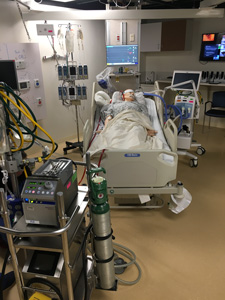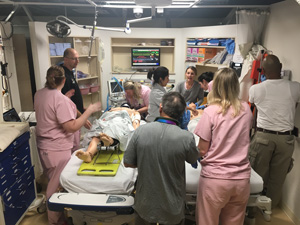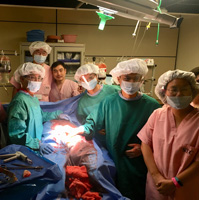 Housed within the Shock Trauma Critical Care Tower, the 10,000 square foot state-of-the-art Simulation Center features flexible learning spaces designed to mimic real operating rooms, as well as adjacent classrooms with teleconferencing capabilities.
Housed within the Shock Trauma Critical Care Tower, the 10,000 square foot state-of-the-art Simulation Center features flexible learning spaces designed to mimic real operating rooms, as well as adjacent classrooms with teleconferencing capabilities.
Just as professional athletes commit to practices and scrimmages before an actual match, so do the medical professionals here at the Shock Trauma Center. Medical simulation is a bridge between classroom learning and hands-on clinical care. High-fidelity simulation exercises provide opportunities for new graduates and experienced providers alike to hone their knowledge and skills in settings that are nearly indistinguishable from real-life and most importantly, without any risk to patients.
 In simple terms, the Simulation Center is the medical equivalent of the practice field. Repetition and practice matter when life is on the line and the clock is ticking for a trauma patient. The more the team practices together, the better they are prepared to handle the challenges of real-life trauma.
In simple terms, the Simulation Center is the medical equivalent of the practice field. Repetition and practice matter when life is on the line and the clock is ticking for a trauma patient. The more the team practices together, the better they are prepared to handle the challenges of real-life trauma.
To mimic real-life encounters, the Simulation Center team devises scenarios where clinicians and medical personnel can practice the management of rare, but high risk, situations. For example, what if a fire catches in the operating room during a surgery? What if a minute of delay during a surgical procedure means the difference between life and death for the patient?
During an exercise in the Simulation Center, each of these scenarios is staged to look, feel, sound, and smell just like it would in real-life. Real fires are set and alarms sound from the very same equipment found in actual operating rooms.
 From the control room, facilitators observe each participant and, quite simply, throw curveballs into routine operations and situations to test the team’s response. Every scenario is recorded so that all participants, from experienced physicians to techs, can evaluate their individual and team performance. During post-simulation debrief meetings, the participants discuss lessons learned, ways to improve performance, and preventative strategies, ultimately improving patient safety, quality of care and outcomes.
From the control room, facilitators observe each participant and, quite simply, throw curveballs into routine operations and situations to test the team’s response. Every scenario is recorded so that all participants, from experienced physicians to techs, can evaluate their individual and team performance. During post-simulation debrief meetings, the participants discuss lessons learned, ways to improve performance, and preventative strategies, ultimately improving patient safety, quality of care and outcomes.
The trainings that take place in the Simulation Center ensure that our physicians, nurses and clinical teams are prepared to handle the most challenging cases and provide the best outcomes possible for patients when every moment counts. Simulation training also supports and strengthens the mission of the Shock Trauma Center as a leader in trauma medicine.
Your gift will enable Shock Trauma to continue to innovate and make advancements in all aspects of simulation training and critical care medicine. To make a donation, please click below or call 410-328-5770 for more information.